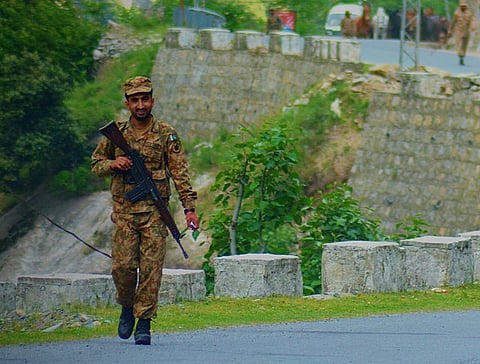

The Pakistan military has issued a forceful response to what it terms "delusional, provocative and jingoistic statements" from India's senior leadership, warning that any future conflict between the nuclear-armed neighbors would lead to "cataclysmic devastation." In an official statement released on Saturday, October 4th, the Inter-Services Public Relations (ISPR) cautioned that Pakistan would "resolutely respond, without any qualms or restraint" if a fresh round of hostilities is triggered . The statement underscores a dangerous escalation in rhetoric, with Pakistan asserting it is prepared to shatter the "myth of geographic immunity" and hit the "farthest reaches of Indian territory".
The ISPR's statement comes as a direct rebuttal to a series of aggressive remarks made by Indian Defence Minister Rajnath Singh, Army Chief General Upendra Dwivedi, and Air Chief Marshal A P Singh . General Dwivedi had warned Pakistan to stop sponsoring terrorism if it wanted to "retain its place on the map," while the Air Chief claimed, without providing evidence, that a dozen Pakistani military aircraft were destroyed in the May conflict . The Pakistan military labeled these comments an attempt to "fabricate arbitrary pretexts for aggression" and stated that India's narrative has been sufficiently debunked, with the world now recognizing India as the "epicenter of regional instability" .
The current war of words cannot be separated from the intense four-day military conflict in May 2025, which brought the two nations to the brink of a major war . That conflict, referred to as "Marka-e-Haq" (Battle of Truth) by Pakistan, saw both sides engage in missile, drone, and artillery exchanges . In its aftermath, Pakistan announced a significant strategic development: the creation of the Army Rocket Force Command (ARFC) . This new force, equipped with modern technology, is designed to centralize control of conventional missile systems, providing Pakistan with deep-strike options against high-value targets in India without lowering the nuclear threshold . Analysts see this as a direct move to plug capability gaps exposed during the May fighting and a long-term evolution of Pakistan's military doctrine .
Pakistan's statement establishes what it calls a "new normal of response," which it characterizes as "swift, decisive and destructive" . The military emphasized that its armed forces possess the capability and resolve to "take the fight to every nook and corner of the enemy's territory" . In a powerful retort to threats of being erased from the map, the ISPR stated, "India must know that if a situation comes, the erasure will be mutual" . This firm posture signals a fundamental shift in Pakistan's declared retaliatory policy, moving away from restraint and toward a promise of overwhelming and far-reaching conventional retaliation.
The escalating verbal confrontation risks seriously undermining the fragile ceasefire that ended the May conflict and could have grave consequences for the entire South Asian region . The exchange of stark warnings between two nuclear powers has raised the stakes immensely, with the potential for any military miscalculation to spiral into a broader conflict. The international community is now watching closely to see if diplomacy can prevail over heightened tensions and inflammatory rhetoric, as the path toward de-escalation appears increasingly narrow.